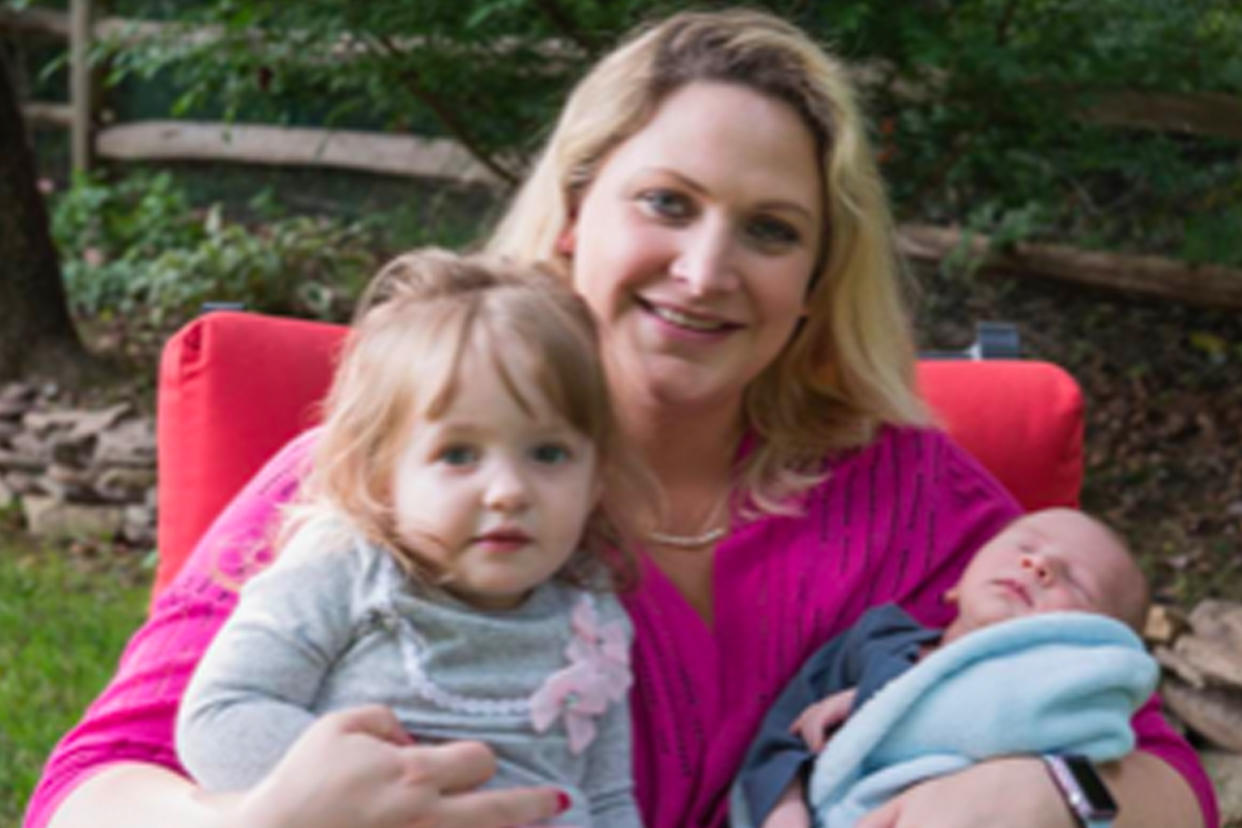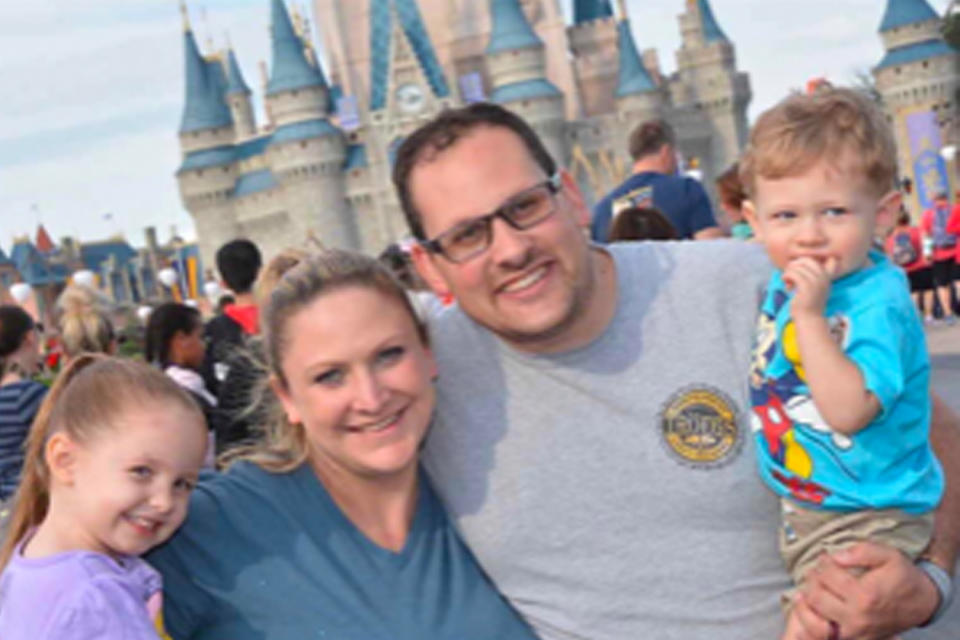This new mom thought she had hemorrhoids — but it turned out to be cancer

As a nurse, Lauren Riccotone had always been proactive about her health care, but in 2015 she was young and healthy and didn’t think twice about the occasional spot of blood that appeared on her toilet paper. “I thought it was just a hemorrhoid or something I ate — I wasn’t too worried,” Riccotone, now 37, recalls.
Her husband, Chris, still urged her to get a colonoscopy — a procedure, done under sedation, to evaluate gastrointestinal problems, such as changes in bowel habits and rectal bleeding, as well as to detect colorectal polyps and cancer in either the large intestine (colon) and rectum. She agreed, and on the day of the colonoscopy, they got an unexpected surprise. “I went through all the preparation for the procedure, including a pregnancy test,” Lauren tells Yahoo Lifestyle. “But just as I was getting ready to have anesthesia, the results came in: I was pregnant.”
Thrilled by the unexpected news, Lauren decided to put off the colonoscopy, as she didn’t want to subject her unborn baby to anesthesia. She sailed through her pregnancy, and Lauren and her obstetrician attributed the occasional bleeding to pregnancy-related hemorrhoids or constipation. On January 9, 2016, she gave birth to baby girl Charlie Elizabeth.

Caught up in the realities of new motherhood, Lauren didn’t even think to reschedule her colonoscopy. But two weeks after giving birth, disaster struck: “I went to the bathroom and suddenly there was blood everywhere, from both my rectum and vagina,” she recalls. “I was so dizzy and weak I could barely stand.”
Concerned that it was some sort of delivery complication, Chris rushed from his job as a paramedic to bring Lauren to the emergency room. She was diagnosed with colitis, or inflammation of the colon lining. “I had a two-week-old I was trying to nurse, so I managed to get discharged after about 48 hours with the condition that I get an immediate colonoscopy,” she says.
She went in expecting a diagnosis of hemorrhoids and left stunned: Lauren had stage 3B colorectal cancer. “When I woke up from the procedure, the nurse gave me a big hug and told me she was getting my husband, which I thought was weird,” she remembers. “Even after getting the news, I was in total shock. I didn’t cry — I was in total disbelief. I was so young, and I had no family history of colon cancer. It just didn’t seem possible.”
Since Lauren was a nurse, and her husband a paramedic, they were well versed in the local medical community and were able to get a next day appointment with Sanjay Reddy, MD, a surgical oncologist at Fox Chase Cancer Center in Philadelphia. “The tumor was so large that Dr. Reddy told me it would have perforated my intestine within days,” she says. But she walked out with Reddy’s cell phone number and a sense of reassurance. “I automatically really liked him — I came in with a ton of questions and he sat down with me and made sure to go through them all,” Lauren says. “I felt very comfortable in his care.”
In March 2016, Reddy performed surgery. “It killed me to be separated from my daughter — the surgery was on Good Friday, and Chris brought her to visit on Easter, and all I could think was thank god she is so little she won’t remember that Mommy is sick,” says Lauren.

But Lauren’s ordeal wasn’t over yet. She had to immediately start six months of chemotherapy, which meant that she not only had to battle bone-crushing nausea and exhaustion, but also had to stop nursing her daughter. Her mother took an early retirement so that she could temporarily move into Lauren’s home and help her with Charlie. Midway through her chemo, Lauren returned to work, but had to call out of her first day when blood work revealed that her white blood cell count was so low that it would be dangerous to allow her to work in an emergency room.
Finally, by February 2017, it appeared that the end was in sight. Lauren had finished chemotherapy and was enjoying time with her husband, baby and two dogs. She was still experiencing some residual nausea and fatigue, which her doctors reassured her was due to recovering from chemotherapy. But when she ended up in the emergency room with a stomach bug, Lauren got another surprise: She was pregnant again. “I hadn’t ever gotten my period back, but I had just assumed that the chemotherapy had put me into premature menopause,” she explains.
Overjoyed, Lauren began planning for her second pregnancy. Since she was expecting, her follow-up CT scans to check for cancer had to be put on hold. Her son Michael was born in August 2017. A month later she had her first scan, only to learn that there were spots on her lung. Her colon cancer had metastasized and spread to her lungs. She would require immediate surgery.
Lauren was devastated. “Here I was again, with a newborn and a cancer diagnosis,” she says. But she was determined and sprang into action. “We knew we would need around the clock care for a month, and Michael was only four weeks old, so I wrote out a schedule from 7 a.m. to 10 p.m. every day and family members and friends took turns coming out to watch the kids while I was recovering,” she says.
Once she recovered, Lauren went back to work. “I would work the night shift, leave work at 7 a.m., go to chemo at 8 a.m., and sleep in the chemo chair while I knew my kids were at home with my mom,” she says. Now, 16 months later, Lauren is still disease free and determined to stay that way. The five-year survival rates for stage four colon cancer are only 14 percent, according to the Colorectal Cancer Alliance, but Lauren is confident she will beat those odds. “I have so much to live for — every time I come home from work and see my kids so healthy and happy, it motivates me to keep fighting,” she says.
In the meantime, Lauren has also thrown herself into advocacy work to raise awareness with younger adults about the disease. Colon cancer and rectal cancers are rising in Gen Xers and millennials at record rates: About 30 percent of new rectal cancers, for example, are now diagnosed in people younger than age 55, double what they were in 1990, according to a 2017 study published in the Journal of the National Cancer Institute.
“I work in the ER of a large health system, so I deal with cancer, including cancer in younger people, every day,” Lauren says. “But a lot of people my age doesn’t recognize that it can happen to them.”
If you have any signs of colon cancer, such as bleeding, diarrhea, or constipation that doesn’t go away after a few days, see your doctor immediately. “Even some physicians will brush off bleeding in a 30-year-old as hemorrhoids,” Lauren says. “But it should still always be checked out with a colonoscopy.”
Read more from Yahoo Lifestyle:
Having a stroke in your 50s, like Luke Perry, is ‘actually quite common’
Why women 30 and older need to ask for this at their next Pap test
Follow us on Instagram, Facebook, and Twitter for nonstop inspiration delivered fresh to your feed, every day.
